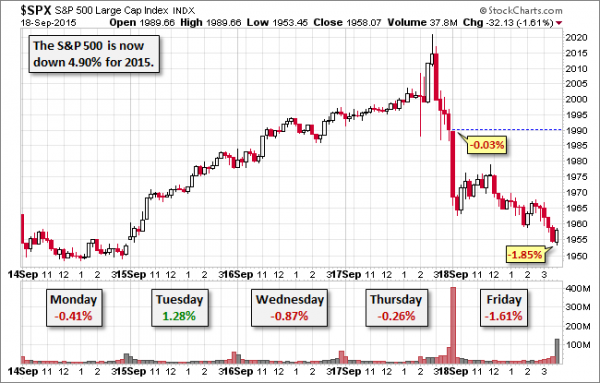Despite many signs of economic improvement, the Fed chose to maintain policy accommodation at emergency levels. In a week that is light on data and long on speeches, this news will be enough to keep Fed policy at the forefront. The punditry will be asking:
Has the Fed Assumed a Third Mandate?
An Opportunity for Readers: Ask Me Anything
The AMA sessions are the rage these days, and I agreed to participate in one next week. I certainly do not have all of the answers. I have had success in figuring out where to look and identifying real experts on many topics. I answer as many questions as possible in the comments and via email, but I expect this session to be more wide-ranging.
Thanks to Scutify for inviting me. If readers are interested in asking something, you can do so in advance. The entire session will be available later as well, but I hope to interact with many at the scheduled time of 2PM EDT on Wednesday, 9/23. There is no charge, so I have some hope that the discussion will provide a net profit for participants!
Young Writers
Consider entering the competition for the Bracken Brower prize. You need to be under age 35 to compete for this very meaningful award.
Prior Theme Recap
In my last WTWA I predicted that it would be all Fed, all the time. That was an easy one! It was a sharply divided week, with a good-looking market into the Fed meeting and for a few minutes afterward. As he does each week, Doug Short’s recap describes the action with appropriate wariness about causality. As always, the full article includes several other helpful charts. (With the ever-increasing effects from foreign markets, you should also add Doug’s Doug Short’s recap to your reading list).
The chart shows it as a flat week, but you can readily see why it did not feel that good. The week was good enough for the Texas boys to maintain the post-Cramer slot on CNBC, but another day or two of this will bring back “Markets in Turmoil.”

We would all like to know the direction of the market in advance. Good luck with that! Second best is planning what to look for and how to react. That is the purpose of considering possible themes for the week ahead. You can make your own predictions in the comments.
This Week’s Theme
We are in the period before the important new earnings season. The economic calendar is a bit light. There is a strong focus on international issues. I expect plenty of attention to the meeting of Israel’s Prime Minister Netanyahu with Russia’s Vladimir Putin. Chinese President Xi Jinping has a state visit to the U.S., including a summit meeting with President Obama. Pope Francis will also continue his tour, including a Presidential meeting on Wednesday.
The international theme comes in the wake of last week’s FOMC decision, which acknowledged the influence of foreign markets on the U.S. economy. The Fed has two legal mandates: maximizing employment and maintaining price stability. Through the mere mention of issues in China and emerging markets, the punditry has a fresh angle on their favorite topic: Criticizing the Fed. The question on the week will be:
Has the Fed taken on a new mandate?
As always, the viewpoints are varied.
The Viewpoints
The post-mortem Fed opinions include the following:
- The Fed failed on transparency, by not tipping off the decision in advance. (You just can’t make this stuff up).
- The Fed missed the chance to raise rates, and is already way too slow.
- The Fed needs to hurry to raise rates to that they can cut when the next recession hits. It is right around the corner.
- The Fed is warning about global economic weakness.
- The Fed is sending a muddled message.
- None of this was very relevant. Investors should tune out the noise.
As always, I have my own ideas in today’s conclusion. But first, let us do our regular update of the last week’s news and data. Readers, especially those new to this series, will benefit from reading the background information.
Last Week’s Data
Each week I break down events into good and bad. Often there is “ugly” and on rare occasion something really good. My working definition of “good” has two components:
The Good
There was a little good economic news.
High-frequency indicators are generally positive. New Deal Democrat’s indispensable weekly summary includes many indicators that get insufficient attention His conclusion reflects our theme this week:
Once again, those portions of the US economy most exposed to global forces have turned negative, while those most insulated from global problems are generally positive. With housing and motor vehicles still quite positive, I remain positive on the US economy at least through the second quarter of next year, and increasingly so as to the third quarter as well.











Leave A Comment